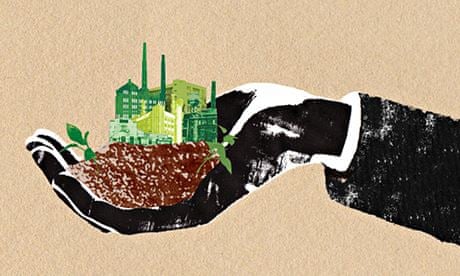Many companies are interested in developing sustainable growth strategies, but struggle to know where to start. A number of new business theories promise to point them on their way.
A common starting point for most businesses is the desire to reduce their negative impacts on society and the environment while simultaneously growing sales. Finding ways to increase product efficiency understandably plays a vital role in this pursuit.
"Everything – from aircraft to cars to white goods – is getting more efficient as an individual unit," says Dax Lovegrove, former head of business sustainability and innovation at environmental charity WWF. "But consumption of these products is going sky high."
One common problem is that efficiency gains are cancelled out by increased consumption. The concept of "decoupled growth" sets out to tackle this problem. The United Nations Environment Programme defines decoupled growth as business models that "use less resources per unit of economic output and reduce the environmental impact of any resources that are used".
Under the banner of its Sustainable Living Plan, Unilever has become a vocal champion of "decoupling". The Anglo-Dutch consumer goods company has set itself the ambitious target of doubling turnover by 2020, while simultaneously halving its impacts on the planet.
Dry facts
The introduction of "dry shampoo" demonstrates the sort of practical solution it has in mind. Marketed under leading Unilever brands such as Dove and TRESemmé, the novel spray-based shampoo results in 90% fewer greenhouse gas emissions compared to washing hair in heated water. Launched in 2011, sales of the eco-friendly product doubled in the UK the following year.
While Lovegrove welcomes the theory of decoupled growth, he issues a word of caution: "We are never going to reach absolute decoupling by product innovation alone. There needs to be a much more fundamental shift in how companies do business."
Some are looking to the theory of "net positive" for just such a shift. Global brands such as Coca-Cola, Rio Tinto, Kingfisher and Ikea are among the initial advocates of the idea, which holds that companies' positive contributions should cumulatively outweigh their negative impacts.
BT's Net Good programme provides an illustrative case. The UK telecoms company now adopts an "end-to-end" definition of its carbon impacts. This includes all emissions related to its suppliers and its consumers, as well as its own operations. BT's Net Good goal is to help customers reduce carbon emissions by at least three times the end-to-end carbon impact of its business.
Kevin Moss, programme director at BT, describes the company's net positive strategy as an "opportunity to grow". As he notes: "Our future success depends on this. The question is: 'do you want to survive or thrive?' To thrive, this has to be part of your core strategy."
The approach plays well with investors, he adds. Why? "Because it's a growth story – it's not just about cost reduction and risk mitigation."
Another emerging concept touted among corporate sustainability strategists is "natural capital". Borrowed from the world of environmental accounting, the idea rests on the insight that clean water, air purification and other so-called "ecosystem services" are not being properly priced. The real value of avoided greenhouse gas emissions from conserving forests, for instance, is estimated at a staggering $3.7tn per year, according to the United Nations Environment Programme.
How to price nature
Putting a price on nature's services represents a much-needed attempt to "change the rules of the game so those [companies] that are doing well are rewarded for it", argues Eva Zabey, head of the World Business Council for Sustainable Development's natural capital programme.
She points to the example of Dow Chemical, now in the third year of a six-year partnership with The Nature Conservancy. The project involves validating tools and models for valuing the ecosystem services used by the US chemical company. French water utility Veolia is making similar strides with its True Cost of Water programme, which sets out to put a price on direct and indirect water costs as well as future water-related risks.
A final theory exciting interest is that of "shared value". Coined by US management gurus Michael Porter and Mark Kramer, the idea promotes the "simultaneous creation of social and business value", says Marc Pfitzer, managing director of consultancy FSG.
UPS is one of the concept's early adopters. In pursuit of shared value outcomes, the global logistics firm aligns its sustainability initiatives with its core strengths as a business. Hence the company's work in the field of disaster relief, where its expertise in logistics can prove invaluable to delivering emergency supplies to victims. In a similar way, UPS recently purchased 1,000 propane package delivery trucks and installed 50 fuelling stations as part of its on-going testing of low-carbon transport alternatives.
"When you approach sustainability from a position of your strengths, the line between the two realms of value creation – helping to make the business profitable and helping to keep the planet well – begins to blur," says Kurt Kuehn, chief financial officer at UPS.
The chief selling point of shared value is as a tool for innovation. Robert Gabriel, a sustainability expert at consultancy PE International, cites the example of US medical technology company Becton Dickinson which, in an attempt to protect health workers from contracting HIV, developed an assortment of needle-less intravenous devices. "Now it is a $2bn business!" Gabriel enthuses.
Theories of decoupled growth, net positive, natural capital and shared value point to a move by management theorists away from the "why" of sustainable business to the "how". All look appealing on the blackboard. What's now required is thorough testing in the real world of business.
This content is brought to you by Guardian Sustainable Business in association with UPS. Produced by Guardian Professional to a brief agreed and paid for by UPS. All editorial controlled and overseen by the Guardian.

Comments (…)
Sign in or create your Guardian account to join the discussion